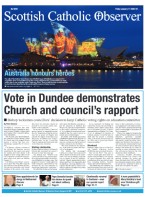BY Ryan McDougall | January 10 | ![]() 0 COMMENTS
0 COMMENTS ![]() print
print

A historian’s take on learning from the past
In the second part of an exclusive interview, the historian Tom Holland talks to Richard Purden about the SNP, the Jordan Peterson phenomenon and the experiences which impacted his own Christian Faith.
Elements of Scotland’s historical Presbyterian culture continue to reverberate around the Scottish National Party, affecting their means of presenting themselves to the rest of Scotland and the wider world. So says Tom Holland, the historian and author of Dominion: The Making of the Western Mind.
“One of the things that emerges in this Presbyterian country is the idea of an elect that can dignify the Christian people. As a whole that becomes very important to civic culture in Scotland through the Church of Scotland and various other Presbyterian churches. The sense of an elect becomes fundamental to the way the Scots tend to see themselves. The Scots are somehow a uniquely virtuous people and that requires effort and cost but in the end virtue and election will out. National secularism has inherited that idea from the 17th-century Covenanters.”
The 51-year-old writer and broadcaster admits it is hard to prove exactly what words can be attributed to the historical Jesus. While there is a desire among some to distinguish or separate the Jesus of the Gospels from the historical Jesus, the historian believes that this is a fruitless and redundant enterprise.
Lifetime study
“Did this story actually happen and how much can we actually prove? It requires a lifetime of study which I can’t offer. The question of how the Jesus of the Gospels relates to the historical Jesus—I’ve come to the conclusion that it doesn’t matter because what is astounding is that if the historical Jesus did not say the things he said, the character of Jesus as portrayed is the most remarkable literary creation of all time.
“You are asking a writer to take the character of these four Gospels and have them create someone from a humble background who ends up nailed to a cross and tortured to death. You are also asking the portrayal to be someone who is conterminous with the one Creator God of Heaven and Earth. Finally, you’re asking for them to do it in such a way that for 2,000 years the world will believe that person is God; that is a hard ask. Endless straining after hard documentary fact is unnecessary.”
Holland also points towards the supernatural nature of the story. “The quality of the uncanny, the quality of strangeness in the portrayal of the Jesus of the Gospels is on the miraculous and there really is your answer.”
Jordan Peterson
In a world which appears to grow increasingly chaotic and confused, the author considers the impact of Professor Jordan Peterson on the 300,000 people from both religious and secular backgrounds who have attended lectures in 130 cities including Glasgow and Edinburgh during his 12 Rules For Life tour.
“I think that there is a kind of feeling of emptiness and deracination where the roots of things are being pulled up. There is a desire for a self-confident assertion of what can be cast as a fundamental truth.
“One of the problems of the institutional churches is a loss of confidence. The Catholic Church has lost confidence since Vatican II and the sexual abuse scandal while Protestantism has blurred into a kind of agnosticism. Neither of them offer the sense of moral clarity that people are looking out for.”
Holland returns to our earlier topic of author J. R. R. Tolkien, suggesting the key to Peterson’s popularity is the fact that he is dealing in absolutes and binary opposing forces.
Tolkien
“Tolkien offers a grandeur of vision in a world where good and evil exist, where angels and devils exist.
“A lot of that has been purged from the Christian world view as being a superstition. In Africa, angels and demons are taken for granted, here slightly too much of the baby has gone out with the bathwater. Jordan Peterson talks very much in these archetypes.”
Among many Christians and Catholics there remains contentious issues around sexual politics and identity. This has been a sad source of discord and pain for both sides of the keenly felt arguments.
“There are no absolute answers,” suggests the historian. “The idea that God created man and woman is fundamental from Hebrew Scriptures. The man is Christ and the woman is the Church, their marriage symbolises Christ’s relationship to His Church, that has been fundamental since Paul.
“That said, it is also the case that those who are oppressed, unhappy and bullied… Scripture commands should be loved and cared for. There is a grinding of two injunctions and what a Christian chooses to emphasise will depend on personal perspective. It’s one of the dilemmas that Christianity has had over the course of 2,000 years.”
Personal beliefs
Dominion is dedicated to Deborah Gillingham who Holland describes as his ‘much loved and much missed Godmother.’ Along with his mother, both women had a strong Christian and Anglican influence on his early life. The author admits he had a ‘wobble’ at an early age in terms of his own personal belief. He adds there was no ‘light-bulb moment’ but that his sense of belief gradually ‘dimmed.’
That was until he travelled to Sinjar in northern Iraq to make a documentary, ISIS: The Origins of Violence for Channel 4.
“I came to realise that I’m very Christian and almost everything I think derives from Christianity. I felt the power of that cultural inheritance when visiting Sinjar, a town captured by Islamic State.
“Many of the inhabitants were enslaved and crucified and the people who had done this were in striking distance. It was a kind of blasphemy that the cross represented this kind of power, brutality and horror, and was not a symbol of hope and triumph.
“I felt something very viscerally inside of me that transcended reason and objectivity. It was something that felt like a kind of light. I’m deep in the process of nurturing that flame and what it shows me.”
—Tom Holland’s Dominion: The Making of the Western Mind published by Little, Brown is out now










